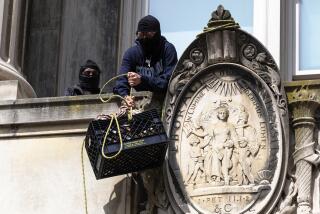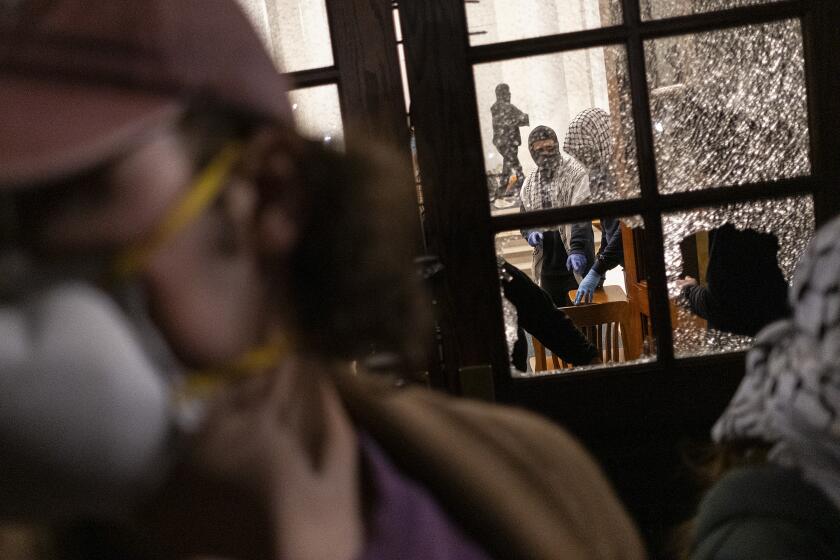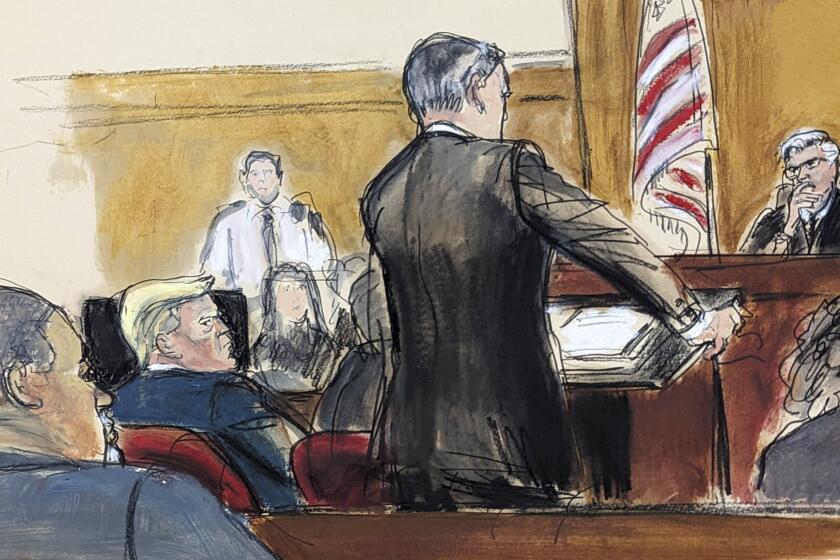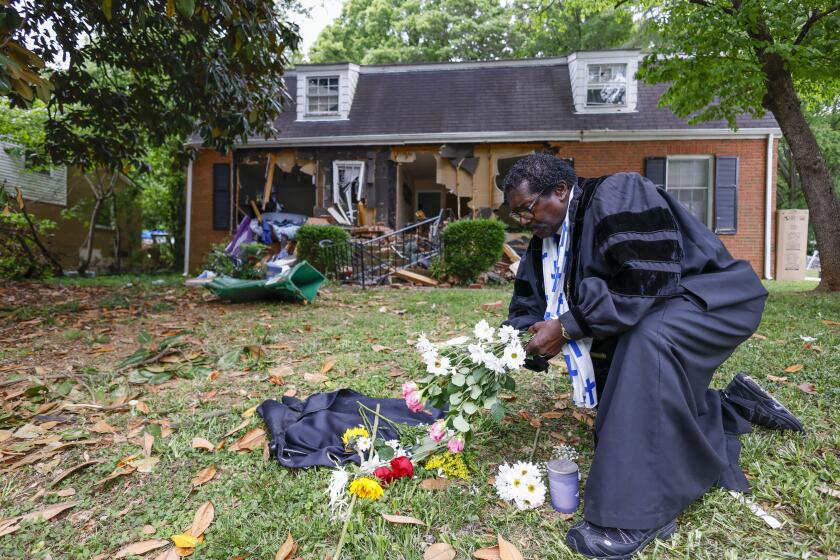Senior Leader of Al Qaeda Is Killed in Blast
An Egyptian believed to be commander of Al Qaeda international terrorism operations was killed last week in Pakistan’s mountainous border region near Afghanistan, President Pervez Musharraf said Saturday.
Abu Hamza Rabia died Thursday in an explosion in the tribal area of North Waziristan, Musharraf told reporters during an official visit to Kuwait.
Pakistani Information Minister Sheikh Rashid Ahmed, who was traveling with Musharraf, described Rabia as either No. 3 or No. 5 in the Al Qaeda hierarchy. In Washington, a senior U.S. counter-terrorism official agreed that Rabia was responsible for international planning, including operations against the United States.
“People like to put numbers on these people and we try to stay away from that,” said the counter-terrorism official. “But no one would take issue with [Rabia] being described as the No. 3 behind [Osama] bin Laden and [Ayman] Zawahiri. He’s a senior member of Al Qaeda and this is a significant blow to them.”
At the same time, other experts cautioned that the killing was likely to have a limited effect because Al Qaeda is less a hierarchical organization and more a movement that can carry out missions without direction from top leaders.
Pakistani and American officials have said they believe Bin Laden is alive and probably hiding somewhere along the rugged border between Pakistan and Afghanistan. His top lieutenant, the Egyptian Zawahiri, has tried to rally the network’s supporters in several recent video and audio tapes.
Rabia is said to have taken over Al Qaeda’s international operations after the capture of Libyan Abu Faraj Farj in early May. Farj was handed over to U.S. authorities a month later, and his whereabouts have not been disclosed. Farj had been seen as the successor to Sept. 11 planner Khalid Shaikh Mohammed, who was captured in Pakistan in 2003.
Contrasting reports quickly emerged about the circumstances surrounding Rabia’s death.
Pakistani authorities said Rabia was killed along with five other militants when bomb-making material exploded in a house where they were hiding in the village of Asoray, east of Miram Shah, the region’s administrative capital.
However, Pakistan’s English-language Dawn newspaper reported that the explosions were caused by several missiles from a drone around 1:45 a.m. Thursday.
Residents heard six explosions, and “three foreigners of Middle Eastern origin,” including Rabia, were later pulled from the rubble and buried in an undisclosed location, according to the Dawn report. It quoted unnamed “officials and tribal witnesses.”
The U.S. has repeatedly flown drones armed with missiles along the rugged border between Pakistan and Afghanistan. But armed operations by foreign forces are a sensitive political issue for Musharraf, so if the U.S. was involved in Rabia’s death, Pakistan’s government would be unlikely to confirm it.
Rabia suffered a slight leg wound in a similar attack on Nov. 5 that killed eight people, including his wife and children, the Dawn report said.
Pakistan has called Rabia one of a group of extremists involved in attempts to assassinate Musharraf in 2003. In August 2004, the government offered rewards for Rabia and others, with experts saying at that time that Rabia ranked eighth in Al Qaeda’s hierarchy.
Several counter-terrorism specialists Saturday questioned the usefulness of such rankings.
“We need to shy away from rank ordering these guys, other than Bin Laden and Zawahiri,” said Roger W. Cressey, a former White House counter-terrorism official in the Bush and Clinton administrations. “But clearly, he was upper tier and a significant figure. He’s one of the people who was involved in planning and operational management, and anytime you get one of these guys you are hurting their ability to target the United States.”
However, Cressey warned, “These guys don’t need links to what’s left of Al Qaeda to carry out attacks.”
W. Patrick Lang, a former senior official with the Defense Intelligence Agency, agreed that militants would not necessarily be stymied by the loss of a leader.
“The death of a particular personality is a problem for them, but it’s something they are likely to overcome,” Lang said. “This is a movement, a large-scale phenomenon. If you killed Osama bin Laden, you wouldn’t stop the movement. We are going to have to deal with these people for a long time.”
At the time of Farj’s arrest, Pakistan’s government called it the most important capture of a senior Al Qaeda leader since that of Mohammed. When Farj was still at large, senior Pakistani intelligence officers insisted he was more of a regional commander than an international terrorist in Mohammed’s league.
Musharraf has repeatedly said that numerous raids and military offensives in the Pushtun tribal areas of North and South Waziristan have severely disrupted Al Qaeda’s ability to plan and carry out terrorist attacks.
Those plotting to kill Musharraf have also included low-ranking members of Pakistan’s military. In August, several people accused of attempts on Musharraf’s life, including two bomb attacks on his convoy in December 2003, were sentenced to hang by a military court-martial.
Watson reported from New Delhi and Silverstein from Washington.
More to Read
Start your day right
Sign up for Essential California for news, features and recommendations from the L.A. Times and beyond in your inbox six days a week.
You may occasionally receive promotional content from the Los Angeles Times.






